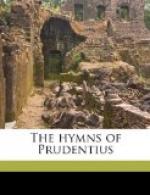Seeing that Prudentius must address himself to most English readers through the imperfect medium of a translation, it may be well to remind those who make their first acquaintance with him that a historical imagination is an indispensable condition of interest and sympathy. If Prudentius has a habit of leaving the main issue and making lengthy and tedious detours into the picturesque parables and miraculous incidents of the Old Testament, there is method in his digressiveness. He knows that one of the charms of Paganism lies in its rich and variegated mythology. Yet Christianity also can point to an even nobler inheritance of the supernatural and the wonderful in the mysterious evolutions of its history. Hence the stories of the early patriarchs, of the Israelites and Moses, of Daniel and Jonah, are imported by the poet as pictorial illustrations of his theme. If occasionally the details border on the grotesque, he certainly reveals a striking knowledge of the Old Testament.
The New Testament is also adequately represented. In one poem (ix.) the miracles of Christ in His earthly ministry and His descent into Hades are narrated with considerable spirit and eloquence. Besides being a student of the Bible, Prudentius is a theologian. His theology is that of the Nicene Creed. The Fall of man, the personality of the Tempter, the mystery of the Trinity and of the Incarnation, the Virgin-birth, the Death and Resurrection of Christ, the pains of the lost and the bliss of the saints, the resurrection of the Body and the life everlasting—these are the themes of his pen, the themes too of the theology of his age. If the poet’s treatment of these truths occasionally appears antiquated and crude to modern ideas, it is at least dignified and intelligent. His mind has absorbed the Christian religion and the Christian theology, and he not unfrequently rises to noble heights in the interpretation of their mysteries.




